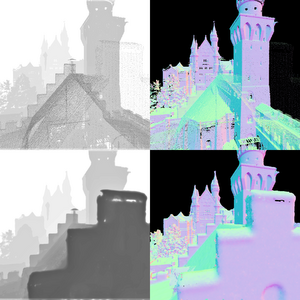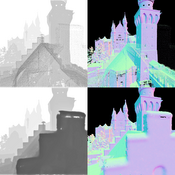Information
- Publication Type: Master Thesis
- Workgroup(s)/Project(s):
- Date: July 2023
- Date (Start): 16. January 2023
- Date (End): 16. July 2023
- TU Wien Library:
- Diploma Examination: 28. July 2023
- First Supervisor:
Abstract
In this work, we propose total variation-based methods for smoothing textured surfaces in point-based rendering and reducing noise in Monte Carlo-rendered images. Initially, we survey the challenges and existing state-of-the-art methodologies in these two research domains. Subsequently, we delve into the details of our proposed total variational models, each aimed at smoothing point-rendered textured surfaces and reducing noise in Monte Carlo-rendered images, respectively. For smoothing textured surfaces in point-based rendering, our model incorporates geometric features and is then combined with an advanced Pull-Push method. This combined approach enables us to effectively fill gaps and smooth discontinuous surfaces. The models tailored for denoising Monte Carlo-rendered images leverage noise-free auxiliary features and noise estimation techniques. Our approach efficiently eliminates noise while preserving crucial image features. We conduct comprehensive comparison experiments against existing state-of-the-art techniques to evaluate the effectiveness of our methods. Although our implementations are currently offline, both the smoothing and denoising processes can be achieved within a few iterations. Given the simplicity of our approach’s implementation, we foresee the potential for a GPU-based implementation, paving the way towards real-time applications.Additional Files and Images
Weblinks
No further information available.BibTeX
@mastersthesis{Liang-2023-TVR,
title = "Smooth textured surface reconstruction from point cloud
rendered images as well as path traced images using
variational methods",
author = "Han Liang",
year = "2023",
abstract = "In this work, we propose total variation-based methods for
smoothing textured surfaces in point-based rendering and
reducing noise in Monte Carlo-rendered images. Initially, we
survey the challenges and existing state-of-the-art
methodologies in these two research domains. Subsequently,
we delve into the details of our proposed total variational
models, each aimed at smoothing point-rendered textured
surfaces and reducing noise in Monte Carlo-rendered images,
respectively. For smoothing textured surfaces in point-based
rendering, our model incorporates geometric features and is
then combined with an advanced Pull-Push method. This
combined approach enables us to effectively fill gaps and
smooth discontinuous surfaces. The models tailored for
denoising Monte Carlo-rendered images leverage noise-free
auxiliary features and noise estimation techniques. Our
approach efficiently eliminates noise while preserving
crucial image features. We conduct comprehensive comparison
experiments against existing state-of-the-art techniques to
evaluate the effectiveness of our methods. Although our
implementations are currently offline, both the smoothing
and denoising processes can be achieved within a few
iterations. Given the simplicity of our approach’s
implementation, we foresee the potential for a GPU-based
implementation, paving the way towards real-time
applications.",
month = jul,
address = "Favoritenstrasse 9-11/E193-02, A-1040 Vienna, Austria",
school = "Research Unit of Computer Graphics, Institute of Visual
Computing and Human-Centered Technology, Faculty of
Informatics, TU Wien",
URL = "https://www.cg.tuwien.ac.at/research/publications/2023/Liang-2023-TVR/",
}

 Thesis
Thesis

